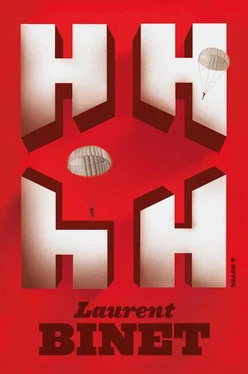Laurent Binet - HHhH
Здесь есть возможность читать онлайн «Laurent Binet - HHhH» весь текст электронной книги совершенно бесплатно (целиком полную версию без сокращений). В некоторых случаях можно слушать аудио, скачать через торрент в формате fb2 и присутствует краткое содержание. Город: New York, Год выпуска: 2012, ISBN: 2012, Издательство: Farrar, Straus and Giroux, Жанр: Историческая проза, на английском языке. Описание произведения, (предисловие) а так же отзывы посетителей доступны на портале библиотеки ЛибКат.
- Название:HHhH
- Автор:
- Издательство:Farrar, Straus and Giroux
- Жанр:
- Год:2012
- Город:New York
- ISBN:978-0-374-16991-6
- Рейтинг книги:3 / 5. Голосов: 1
-
Избранное:Добавить в избранное
- Отзывы:
-
Ваша оценка:
- 60
- 1
- 2
- 3
- 4
- 5
HHhH: краткое содержание, описание и аннотация
Предлагаем к чтению аннотацию, описание, краткое содержание или предисловие (зависит от того, что написал сам автор книги «HHhH»). Если вы не нашли необходимую информацию о книге — напишите в комментариях, мы постараемся отыскать её.
HHhH — читать онлайн бесплатно полную книгу (весь текст) целиком
Ниже представлен текст книги, разбитый по страницам. Система сохранения места последней прочитанной страницы, позволяет с удобством читать онлайн бесплатно книгу «HHhH», без необходимости каждый раз заново искать на чём Вы остановились. Поставьте закладку, и сможете в любой момент перейти на страницу, на которой закончили чтение.
Интервал:
Закладка:
“But I do deny it! I don’t even know which room you were in! Nobody told me!”
There follows a long, unnerving silence.
“You’re lying! Either that or you’re getting careless.”
Naujocks wonders which of these hypotheses is, in his boss’s eyes, the most unforgivable. In a calmer and thus more disturbing voice, Heydrich begins to speak again:
“You should have known where I was. It’s part of your job. It is also your duty to switch off the microphones and tape recorders when I’m there. You didn’t do that last night. If you think you can make a fool of me, Naujocks, you’d better think again. Leave.”
Naujocks—the jack of all trades who, at Gleiwitz, started the war—is sidelined. It is thanks only to his remarkable survival instinct that he is not simply liquidated. After this regrettable incident, he will spend most of his time trying to keep his head down. In the end, this is not a very high price to pay for fucking with Heydrich: his boss, Himmler’s right-hand man, the SS number two, supreme leader of the RSHA, master of the SD and the Gestapo. Heydrich, the Blond Beast, who, through his ferocity but also through his sexual performances, is doubly deserving of his nickname. Or not, as Naujocks must snigger to himself in those moments of calm between the surges of fear.
102
The dialogue in the preceding chapter is the perfect example of the difficulties I’m facing. Certainly Flaubert didn’t have the same problems with Salammbô , because nobody recorded the conversations of Hamilcar, father of Hannibal. But when I make Heydrich say: “If you think you can make a fool of me, Naujocks, you’d better think again,” all I am doing is repeating the words as reported by Naujocks himself. You could hardly hope for a better witness, for reporting a phrase, than the only other person in the room, who heard it and to whom it was addressed. That said, I doubt whether Heydrich really formulated his threat in that way. It’s not his style. What we have here is Naujocks recalling a phrase years after the event, which is rewritten by whoever’s taking down his dictation, and then again by the translator. But Heydrich, the most dangerous man in the Reich, saying, “If you think you can make a fool of me, Naujocks, you’d better think again”… well, it’s a bit lame. It is surely much more likely that Heydrich—a coarse man on a power trip, and angry too—said something along the lines of: “You want to fuck with me? Watch it, I’ll rip your balls off!” But what is my opinion worth compared with an eyewitness account?
If it were up to me, I’d write:
“Tell me, Naujocks, where did I spend the night?”
“I beg your pardon, General?”
“You heard me.”
“Well… I don’t know, General.”
“You don’t know?”
“No, General.”
“You don’t know that I was at Kitty’s?”
“…”
“What have you done with the recording?”
“I don’t understand, General.”
“Stop fucking with me! I want to know if you kept the recording!”
“General… I didn’t know that you were there!… Nobody warned me! Of course, I destroyed the recording as soon as I recognized you… I mean, as soon as I recognized your voice!…”
“Stop bullshitting, Naujocks! You’re paid to know everything, and especially where I am, because I’m the one who pays you! The instant I take a room at Kitty’s, you switch off the microphones! The next time you try to fuck with me, I’ll send you to Dachau, where they’ll hang you up by the balls! Am I making myself clear?”
“Perfectly clear, General.”
“Now fuck off!”
That would, I think, be a bit livelier and more realistic, and probably closer to the truth. But it’s impossible to know for sure. Heydrich could be foulmouthed, but he also knew how to play the icy bureaucrat when the need arose. So, all in all, between Naujocks’s version, however corrupted, and mine, it is undoubtedly better to choose that of Naujocks. But I still think Heydrich would have wanted to rip his balls off.
103
From one of the high windows in the north tower of Wewelsburg Castle, Heydrich contemplates the plain of Westphalia. In the middle of the forest, he can just make out the huts and the barbed-wire fences of Germany’s smallest concentration camp. But his gaze is probably focused on the parade ground, where the troops of his Einsatzgruppen are being drilled. Operation Barbarossa will be launched within a week. Within two, these men will be in Byelorussia, in Ukraine, in Lithuania, and will be seeing action. They’ve been promised that they’ll be home again by Christmas, once their job is done. In reality, Heydrich has no idea how long this war will last. Within the Party and the army, everyone who knows about the operation is highly optimistic. The Red Army’s performances on the battlefield—mediocre in Poland, frankly rubbish in Finland—lead the Nazis to believe that the still-invincible Wehrmacht can achieve a rapid victory. Based on what he’s seen in the SD reports, however, Heydrich is more circumspect. The enemy’s forces—the number of their tanks, for example, or of their reserve divisions—seem to him to have been dangerously underestimated. But the high command of the armed forces has its own information service, the Abwehr, and it has chosen to ignore Heydrich’s warnings and to put its faith instead in the more encouraging conclusions of Admiral Canaris, Heydrich’s former boss. Heydrich, whose expulsion from the navy remains an unhealed wound, must be choking with rage. Hitler has declared: “The beginning of a war is always like opening a door onto a darkened room. You never know what’s hiding in there.” Implicitly, it is admitted that the SD’s warnings might not be baseless. But the decision to attack the Soviet Union has been taken, all the same. Heydrich watches with concern as the clouds gather over the plain below.
Behind him, he hears the voice of Himmler talking to his generals.
For Himmler, the SS is an order of knights. He considers himself a descendant of Henry the Fowler, the Saxon king who, by repelling the Magyars in the tenth century, laid the foundations of the Germanic Holy Roman Empire, and who then spent most of his reign exterminating Slavs. With his claims to such a lineage, the Reichsführer needed a castle. When he found this one, it was a ruin. He had to bring four thousand prisoners from Sachsenhausen, nearly a third of whom died during the renovations. Now, however, it towers imperiously over the Alme, which flows through the valley. Its two towers and its dungeon, connected by battlements, form a triangle whose point, turned toward the mythical land of Thule, birthplace of the Aryans, represents the axis mundi , the symbolic center of the world.
Here in the heart of the dungeon, in a former chapel renamed Obergruppenführersaal, Himmler is holding a meeting that Heydrich has been unable to get out of. In the middle of this great circular room, the highest SS dignitaries are gathered around an enormous oak table. It is round and seats twelve, of course, because Himmler wanted to reproduce the symbolism of the Arthurian legend. But the Reich’s quest for the Grail in 1941 is a little different from Perceval’s. “The final confrontation between two ideologies… the need to seize new Lebensraum …” Heydrich knows this mantra by heart, as do all Germans at the time. “A question of survival… pitiless racial struggle… twenty to thirty million Slavs and Jews…” At this point Heydrich, who is fond of numbers, pricks up his ears: “Twenty to thirty million Slavs and Jews will perish through military actions and the problems of food supply.”
Heydrich does not let his irritation show. He stares at the magnificent black sun inlaid with runes on the marble floor. Military actions… problems of supply… could they be any more evasive? Heydrich is well aware that with certain sensitive subjects one must not be too explicit, but a moment always comes when you have to call a spade a spade—and it seems reasonable to think that this moment has now arrived. Otherwise, through a lack of clarity in their orders, there is a risk that the men will mess things up. And he is the one who’s responsible for this mission.
Читать дальшеИнтервал:
Закладка:
Похожие книги на «HHhH»
Представляем Вашему вниманию похожие книги на «HHhH» списком для выбора. Мы отобрали схожую по названию и смыслу литературу в надежде предоставить читателям больше вариантов отыскать новые, интересные, ещё непрочитанные произведения.
Обсуждение, отзывы о книге «HHhH» и просто собственные мнения читателей. Оставьте ваши комментарии, напишите, что Вы думаете о произведении, его смысле или главных героях. Укажите что конкретно понравилось, а что нет, и почему Вы так считаете.












